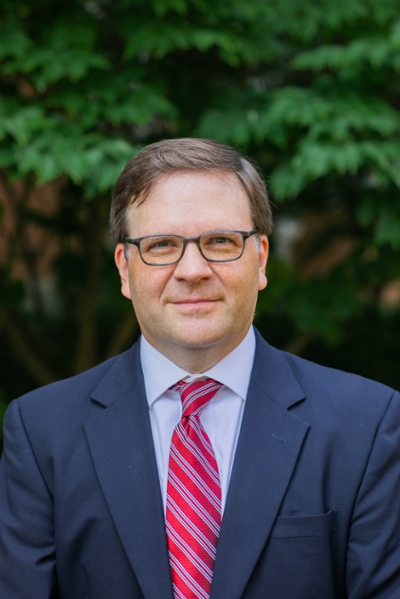Published on April 10, 2020 by Morgan Black

In August, Jeff Anderson, was promoted to assistant professor and assumed the role of director of Cumberland School of Law’s Lawyering and Legal Reasoning (LLR) program.
The LLR program seeks to build a solid foundation in legal reasoning and legal writing that will help first-year law students learn how to think, and write, like lawyers. In two semester-long courses, students learn how to analyze various kinds of legal issues in a rigorous, methodical, and logical way. Students practice issue identification, legal research, and analysis in the context of objective writing – office memos – as well as persuasive writing – trial court motions and appellate briefs. With assistance from selected upper-class students, LLR instructors review drafts, provide small-group and individual conferences, and give individualized comments on written assignments throughout each semester.
“Cumberland’s LLR Program provides an early opportunity for students to gain practical experience with various lawyering tasks,” Anderson says. “They conduct research to answer specific legal questions. And then they communicate their analysis by drafting and revising memos, motions, and briefs. In their first year, while they are learning principles of contract and tort law, and rules of evidence and civil procedure, Cumberland students are also practicing the real-world skills that lawyers employ in their practices every day. Not only does LLR help prepare students to succeed in other law school courses, but it also helps prepare students to do good work for their future employers and clients, in summer jobs and beyond.”
Before joining the Cumberland faculty in 2019, Anderson worked as a law clerk for the Honorable Dennis W. Shedd of the U.S. Court of Appeals for the Fourth Circuit; a civil litigator at large law firms in Birmingham and Washington, D.C.; and an Assistant United States Attorney for the Northern District of Alabama. In 19 years of practice, Anderson gained extensive experience in general and appellate litigation in federal and state courts across the country.
Anderson earned a B.A. from Furman University and a J.D. from the University of Virginia School of Law, where he served as a notes editor for the Virginia Law Review.
Samford is a leading Christian university offering undergraduate programs grounded in the liberal arts with an array of nationally recognized graduate and professional schools. Founded in 1841, Samford is the 87th-oldest institution of higher learning in the United States. Samford enrolls 6,101 students from 45 states, Puerto Rico and 16 countries in its 10 academic schools: arts, arts and sciences, business, divinity, education, health professions, law, nursing, pharmacy and public health. Samford fields 17 athletic teams that compete in the tradition-rich Southern Conference and ranks with the second highest score in the nation for its 98% Graduation Success Rate among all NCAA Division I schools.
